Marketing Information System营销信息系统
MIS战略规划和开发方法概述
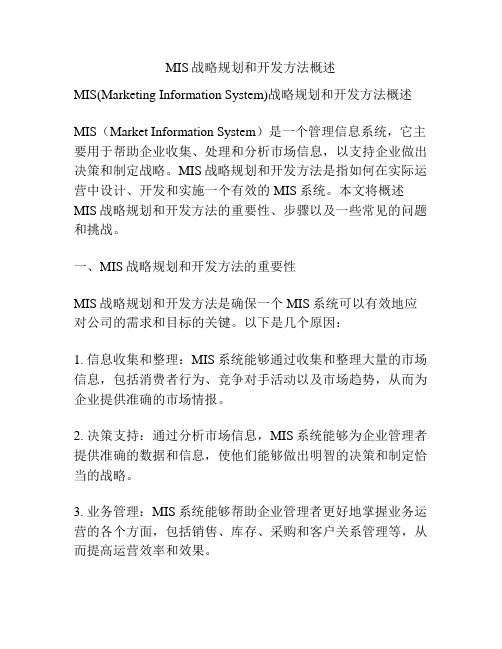
MIS战略规划和开发方法概述MIS(Marketing Information System)战略规划和开发方法概述MIS(Market Information System)是一个管理信息系统,它主要用于帮助企业收集、处理和分析市场信息,以支持企业做出决策和制定战略。
MIS战略规划和开发方法是指如何在实际运营中设计、开发和实施一个有效的MIS系统。
本文将概述MIS战略规划和开发方法的重要性、步骤以及一些常见的问题和挑战。
一、MIS战略规划和开发方法的重要性MIS战略规划和开发方法是确保一个MIS系统可以有效地应对公司的需求和目标的关键。
以下是几个原因:1. 信息收集和整理:MIS系统能够通过收集和整理大量的市场信息,包括消费者行为、竞争对手活动以及市场趋势,从而为企业提供准确的市场情报。
2. 决策支持:通过分析市场信息,MIS系统能够为企业管理者提供准确的数据和信息,使他们能够做出明智的决策和制定恰当的战略。
3. 业务管理:MIS系统能够帮助企业管理者更好地掌握业务运营的各个方面,包括销售、库存、采购和客户关系管理等,从而提高运营效率和效果。
二、MIS战略规划和开发方法的步骤MIS战略规划和开发方法通常包括以下几个步骤:1. 确定需求:首先,企业需要明确自己的MIS系统应该具备什么功能。
这可以通过与内部用户的沟通和调查、分析企业的需求和目标来确定。
2. 确定目标:根据企业的需求和目标,确定MIS系统的目标。
这些目标可以包括提高市场调研、销售、客户关系管理等方面的效率,提高决策的准确性等。
3. 设计系统:设计一个符合企业需求和目标的MIS系统。
这包括确定系统的技术架构、数据库设计、界面设计以及其他关键功能的设计。
4. 开发系统:根据设计的要求,开发MIS系统。
这通常涉及到软件开发、数据库开发和界面设计等方面的工作。
5. 测试和部署:对开发的MIS系统进行全面的测试,确保它满足所有需求和目标。
然后部署系统到实际运营环境中,并培训用户使用MIS系统。
第七章-市场营销调研与预测
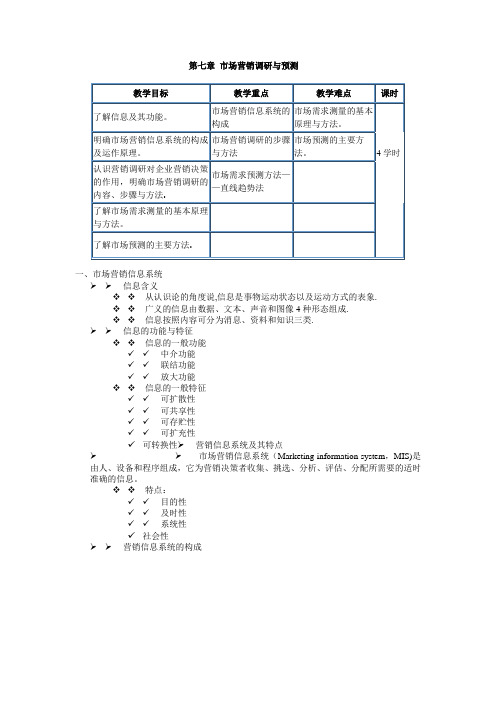
第七章市场营销调研与预测一、市场营销信息系统➢➢信息含义❖❖从认识论的角度说,信息是事物运动状态以及运动方式的表象.❖❖广义的信息由数据、文本、声音和图像4种形态组成.❖❖信息按照内容可分为消息、资料和知识三类.➢➢信息的功能与特征❖❖信息的一般功能✓✓中介功能✓✓联结功能✓✓放大功能❖❖信息的一般特征✓✓可扩散性✓✓可共享性✓✓可存贮性✓✓可扩充性✓可转换性➢营销信息系统及其特点➢➢市场营销信息系统(Marketing information system,MIS)是由人、设备和程序组成,它为营销决策者收集、挑选、分析、评估、分配所需要的适时准确的信息。
❖❖特点:✓✓目的性✓✓及时性✓✓系统性✓社会性➢➢营销信息系统的构成➢➢❖❖能向各级管理人员提供所必需的信息。
❖❖能使各级管理人员方便地选择所需要的信息。
❖❖能满足管理人员对所需信息的时限要求.❖❖能提供各种形式的信息。
❖能向管理人员提供易于理解的最新信息二、营销调研二、营销调研➢➢营销调研的含义及作用❖❖市场营销调研(Marketing Research),就是运用科学的方法,有目的、有计划地系统地收集、整理和分析研究有关市场营销方面的信息。
❖❖作用:✓✓有利于制定科学的营销规划;✓✓有利于优化营销组合;✓✓有利于开拓新的市场。
&营销备忘1市场调研的任务⏹明确营销中的经营决策问题;⏹详细规定研究这些问题所需的信息;⏹设计信息收集的方法;⏹管理并实施数据收集过程;⏹分析调查结果;⏹报告调查结果和解释结果的含义.➢➢营销调研的内容❖❖产品调研❖❖顾客调研❖❖销售调研❖❖促销调研➢营销调研的步骤:案例美国航空公司对飞机上提供电话服务的调研(1)美国航空公司注意探索为航空旅行者提供他们需要的新服务。
一位经理提出在高空为乘客提供电话通信的想法。
其他的经理们认为这是激动人心的,并同意应对此做进一步的研究。
于是,提出这一建议的营销经理自愿为此做初步调查。
信息管理系统 名词缩写

第一章信息系统information system, IS信息技术information technology, IT赛事管理系统games management system, GMS信息传播系统information diffusion system, IDS电子数据处理EDP管理信息系统management information support system,MIS 经理信息系统EIS人工智能AI专家系统ES战略信息系统SIS企业资源计划ERP企业协作系统enterprise collaboration system电子商务electronic commerce运营处理系统operations support system事务处理系统transaction processing system零售点point-of-sale,POS过程控制系统process control system办公自动化系统(企业协作系统enterprise collaboration system)决策信息系统decision support system,DSS经理信息系统executive information system, EIS专家系统expert system知识管理系统knowledge management system,KMS企业职能系统functional business system战略信息系统strategic information system 具有交叉功能的信息系统cross-functional information system信息系统模型information system model信息系统专家IS specialist第二章竞争战略competitive strategy锁定客户与供应商lock in customers and suppliers跨企业的信息系统interenterprise information system发挥信息技术投资的杠杆效应leverage investment in information technology 以客户为中心的企业customer-focused business客户关系管理customer relationship management,CRM业务流程重组business process reengineering,BPR企业资源计划ERP知识创造型企业knowledge-creating company第七章电子化e-business企业应用体系结构enterprise application architecture企业资源计划enterprise resource planning,ERP客户关系管理customer relationship management,CRW业务伙伴关系管理partner relationship management,PRM供应链管理supply chain management,SCM企业应用集成enterprise application integration,EAI事务处理系统transaction processing system,TPS在线事务处理系统online transaction processing system事务处理周期transaction processing cycle企业协作系统enterprises collaboration system,ESC职能业务系统functional business system营销信息系统marketing information system销售人员自动化sales force automation计算机集成制造computer-integrated manufacturing,CIM计算机辅助工程computer-aided engineering,CAE计算机辅助设计computer-aided design,CAD计算机辅助工艺设计computer-sided process planning物料需求计划material requirements planning,MRP制造资源计划manufacturing resources planning制造执行系统manufacturing execution system人力资源信息系统human resource information system人力资源管理HRM在线HRM系统online HRM system会计信息系统accounting information system财务管理系统financial management system第八章业务伙伴关系管理partnenr relationship management,PRM 企业资源计划enterprise resource planning,ERP 供应链管理supply chain management,SCM第九章电子商务electronic commerce企业对消费者(B2C)电子商务企业对企业(B2B)电子商务消费者对消费者(C2C)电子商务实时的个性化real-time personalization,RTP电子支付系统electronic payment system电子资金转账electronic funds transfer,EFT安全电子交易secure electronic transaction,SET一对一营销one-to-one marketing常见问答列表frequently asked question,FAQ对等网络P2P(Peer to Peer)。
浅谈营销管理信息系统应用推广中存在的问题及
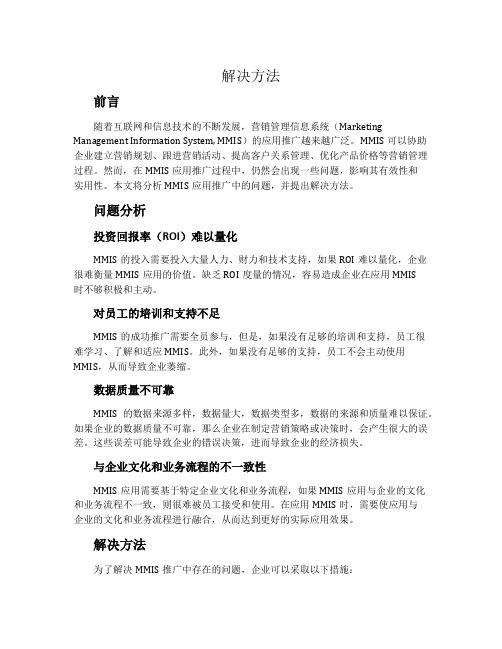
解决方法前言随着互联网和信息技术的不断发展,营销管理信息系统(Marketing Management Information System, MMIS)的应用推广越来越广泛。
MMIS可以协助企业建立营销规划、跟进营销活动、提高客户关系管理、优化产品价格等营销管理过程。
然而,在MMIS应用推广过程中,仍然会出现一些问题,影响其有效性和实用性。
本文将分析MMIS应用推广中的问题,并提出解决方法。
问题分析投资回报率(ROI)难以量化MMIS的投入需要投入大量人力、财力和技术支持,如果ROI难以量化,企业很难衡量MMIS应用的价值。
缺乏ROI度量的情况,容易造成企业在应用MMIS时不够积极和主动。
对员工的培训和支持不足MMIS的成功推广需要全员参与,但是,如果没有足够的培训和支持,员工很难学习、了解和适应MMIS。
此外,如果没有足够的支持,员工不会主动使用MMIS,从而导致企业萎缩。
数据质量不可靠MMIS的数据来源多样,数据量大,数据类型多,数据的来源和质量难以保证。
如果企业的数据质量不可靠,那么企业在制定营销策略或决策时,会产生很大的误差。
这些误差可能导致企业的错误决策,进而导致企业的经济损失。
与企业文化和业务流程的不一致性MMIS应用需要基于特定企业文化和业务流程,如果MMIS应用与企业的文化和业务流程不一致,则很难被员工接受和使用。
在应用MMIS时,需要使应用与企业的文化和业务流程进行融合,从而达到更好的实际应用效果。
解决方法为了解决MMIS推广中存在的问题,企业可以采取以下措施:确定ROI度量方法为了确保MMIS的有效应用,企业需要确保有一个可行的ROI度量方法。
企业可以基于应用MMIS前后的数据、营收、客户满意度等指标进行度量。
另外,企业可以通过对比不同MMIS投资的营收效果,选择最符合企业实际情况的投资方案。
提供充分培训和支持企业可以根据企业的实际情况,制定特定的培训计划和支持方案,以确保员工掌握和适应MMIS应用。
市场营销知识的一些术语
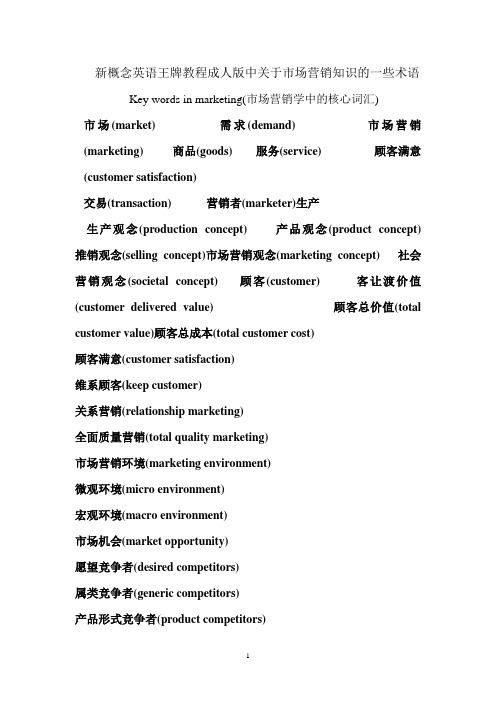
新概念英语王牌教程成人版中关于市场营销知识的一些术语Key words in marketing(市场营销学中的核心词汇)市场(market) 需求(demand) 市场营销(marketing) 商品(goods) 服务(service) 顾客满意(customer satisfaction)交易(transaction) 营销者(marketer)生产生产观念(production concept) 产品观念(product concept) 推销观念(selling concept)市场营销观念(marketing concept) 社会营销观念(societal concept) 顾客(customer) 客让渡价值(customer delivered value) 顾客总价值(total customer value)顾客总成本(total customer cost)顾客满意(customer satisfaction)维系顾客(keep customer)关系营销(relationship marketing)全面质量营销(total quality marketing)市场营销环境(marketing environment)微观环境(micro environment)宏观环境(macro environment)市场机会(market opportunity)愿望竞争者(desired competitors)属类竞争者(generic competitors)产品形式竞争者(product competitors)品牌竞争者(brand competitors) 公众(publics)目标市场(target market)市场营销组合(marketing mix)情绪(moods)消费者行为(customer behavior) 文化(culture)人口统计因素(demographics)社会阶层(social class)亚文化(subculture)参照群体(reference group)角色模型(role stereotype)知觉(perception)认知学习(cognitive learning)动机(motive)个性(personality)情绪(emotion)态度(attitude)自我概念(self-concept)生活方式(life style)组织市场(organizational market) 企业市场(business market)非营利组织(non-profit organization)非营利组织市场(non-profit organization market) 政府市场(government market)直接再购(straight rebuy)修正再购(modify rebuy)新任务采购(new task)购买中心(buying center)倡议者(initiators)使用者(users)影响者(influencers)决定者(deciders)购买者(buyers)控制者(gatekeepers)营销信息(marketing information)营销信息系统(marketing information system,MIS) ~市场调研(marketing research)描述性调研(descriptive research)解释性调研(interpretive research)预测性调研(predictive research)市场需求量(market demand)企业需求量(market demand potential)定性预测(qualitative forecasting)定量预测(quantitative forecasting)企业战略(enterprise strategy)企业使命说明书(mission statement)战略经营单位(strategic business units,SBU)波士顿矩阵(Boston matrix)通用电器公司方法(the General Electric Model,GE) 市场吸引力(marketing attractiveness)业务实力(business attractiveness)密集型增长战略(intensive growth strategies)市场渗透(market penetration strategy)市场开发(market development strategy)产品开发(product development strategy)一体化增长战略(integrative growth strategies)前向一体化(forward integration)后向一体化(backward integration)水平一体化(horizontal integration)多角化增长战略(diversification growth strategies) 同心多角化(concentric diversification)水平多角化(horizontal diversification)复合多角化(conglomeration diversification)市场营销战略(marketing strategy)市场营销组合(marketing mix)市场营销组织(marketing organization)职能型组织(functional organization)地区型组织(regional organization)产品管理型组织(managerial organization of product)市场管理型组织(managerial organization of market)公司与事业部型组织(organization of corporation and business unit) 市场营销管理(marketing management)市场营销计划(marketing planning)市场营销方案(marketing program)市场营销控制(marketing controlling)市场竞争(market competition)完全竞争(market leader)非完全竞争(imprecate competition)垄断竞争(monopolistic competition)市场领导者(market leader)市场挑战者(market challenger)市场追随者(market follower)市场补缺者(market niche)市场细分(market segmentation)目标市场(target market)市场定位(market positioning)无差异性市场战略(undifferentiated marketing tactics)差异性市场战略(differentiated marketing tactics)集中性市场策略(concentrated marketing tactics)产品(product)服务(service)核心产品(core product)形式产品(actual product)期望产品(expected product)延伸产品(augmented product)~潜在产品(potential product)耐用品(durablegoods)非耐用品(nondurable goods)产品线(product line)产品项目(product item)产品组合(product mix or product assortment)产品组合的长度(product mix length)产品组合的深度(product mix depth)产品组合的关联度(product mix consistency)产品生命周期(product life cycle)开发期(development stage)引进期(introduction stage)成长期(growth stage)成熟期(maturity stage)衰退期(decline stage)新产品开发(new product development)产品概念(product concept)商业化(commercialization)包装(package)包装策略(packaging strategy)品牌(brand)品牌命名(brand naming)品牌决策(branding decision)统一品牌(blanket family brand)品牌使用者决策(brand-sponsor decision)个别品牌(individual brand)多品牌(multi-brands)统一的个别品牌(company/individual brand)合作品牌(co-branding)品牌资产(brand equity)品牌设计(brand designing)品牌延伸(brand extension)内涵不变式延伸(gradual changing meaning extension))品牌管理(brand management)成本导向定价(cost-driven pricing)需求导向定价(demand-driven pricing)竞争导向定价(competition-driven pricing)折扣定价(discount pricing)地区定价(region pricing)差别定价(discrimination pricing)撇脂定价(skim pricing)渗透定价(penetration pricing)满意定价(neutral pricing)尾数定价(mantissa pricing)整数定价(integer pricing)招来定价(fetch-in pricing)声望定价(prestige pricing)目标收益定价法(target-return pricing)认知价值定价法(perceived-value pricing)价值定价法(value pricing)通行价格定价法(going-rate pricing)分销渠道(distribution channel)中间商(intermediate)分销渠道设计(distribution channel disign)实体分配(physical distribution)渠道冲突(channel conflict)促销(promotion)促销策略(promotion policies)情感诉求(emotional appeals)理性诉求(rational appeals)道德诉求(moral appeals)大众传播媒体(mass media)气氛(atmosphere)事件(events)量力支出法(affordable method)销售额百分比法(percentage-of-sales method)竞争对等法(competitive-parity method)目标任务法(objective-task method)广告(advertising)公共关系(public relations)营业推广(sales promotion)促销组合(promotion mix)推动策略(push strategy)拉引策略(pull strategy)广告目标(mission)告知性广告(information advertising)劝说性广告(persuasive advertising)提示性广告(reminder advertising)整合营销传播(integrated marketing communication)接触管理(contact management)人员推销(personal selling)服务(service)服务核心产品(core product)服务附加产品(supplementary product)整合服务营销(integrated service marketing)服务的无形性(intangibility of service)服务的体验属性(experience attributes)服务的信任度属性(credence attributes)服务的有形展示(physical evidence)关系营销(relationship marketing)体育营销(sports marketing)绿色营销(green marketing)城市营销(city marketing)网络营销(network marketing)会展营销(exhibition marketing)文化营销(cultural marketing需要:need欲望want需求:demand产品:product关系营销:relationship marketing 营销网:marketing network生产观念:the production concept 产品观念:the product concept相关群体:reference group购买者角色:buying role购买行为:buying behavior认知需求:problem recognization 搜集信息:information search组织者市场:organization market 派生需求:derived demand缺乏弹性:inelastic demand品牌策略:brand strategy制造商品牌:manufactures brand 定价策略:pricing strategie现金折扣:cash discount数量折扣:quantity discount功能折扣:functional discount季节折扣:seasonal discount新产品定价:new product pricing产品组合定价:product-mix pricing分销渠道:distribution channel密集分销渠道:intensive distribution 选择性分销:selective distribution独家分销:exclusive distribution中间商品牌:intermediaries brand批发商:whoksaler零售商:retailer百货公司:department store超市:supermarket便利店:convenience store折扣店:discount store促销组合:promotion mix交流信息:communicating information 人员销售:personalo selling广告策略advertising strateqie公共关系public relation营销调研:marketing research产品策略:product strategie产品组合:product mix营销观念:the marketing concept消费者市场consumer market顾客满意:customer satisfaction顾客总价值:total customer value顾客总成本:total customer value营销环境:marketing environment营销信息系统:marketing information syste 市场细分策略:market segmentation startegie 目标市场策略:market tageting strategie市场定位策略market positioning strategie产品市场寿命周期;the product life cycle销售观念:the selling/sales concept社会营销观念:the societal marketing concept 宏观营销环境:macro-marketing environment 消费者行为模式:model of consumer behavior 价值,成本和满意:value,cost,andsatisfaction 交换和交易exchange and transaction营销者和预期顾客:marketers。
商务英语常用英语词汇大“M”

商务英语常用英语词汇大-“M”商务英语常用英语词汇大汇总-“M”下面是总结的以“M”开头的商务英语常用的'英语词汇。
mandatory adaptation 强制性适应manufacturer brand 制造商/全国性品牌manufacturers' agents/representatives 生产商的代理商/销售代表manufacturers' export agents (MEA) 制造商出口代理manufacturers' sales offices/branches 生产商的销售办事处/分支机构manufacturing process 制造过程manufacturing 制造业market aggregation strategy 整体市场战略market attractiveness factors 市场吸引力因素market attractiveness 市场吸引力market attractiveness/business position matrix 市场吸引力/业务地位矩阵macro risks 宏观风险macroenvironment 宏观环境macrosegmentation 宏观细分mail-order retailers 邮购零售商maintaining market share 保持市场份额maintenance strategy 保持战略management overhead 管理费market circumstances 市场环境market demorgraphics 市场人口分布/统计特征market dimension 市场量度market entry strategies 市场进入战略market exclusion 市场排斥market expansion strategy 市场扩张战略market factors 市场因素market followers 市场跟随者market growth rate 市场增长率market hirarchy 市场等级market inclusion 市场纳入market leaders 市场领导者market measurement 市场测量market opportunity analysis 市场机会分析market oriented 以市场为导向的market 市场marketability 市场开拓能力market-entry strategies 市场进入战略marketing action plan 营销行动计划marketing audit 营销审计marketing channel 营销渠道marketing codes of conduct 营销行为规范marketing communication 营销沟通/传播marketing concept 营销观念marketing control 营销控制marketing decision support systems (MDSS) 营销决策支持系统marketing environment audit 营销环境审计market position factors 市场地位因素market positioning analysis 市场定位分析market potential measurements 市场潜力测度market research 市场研究market segment 细分市场market segmentation 市场细分market share 市场份额market targeting 目标市场选择marketing flows and functions 营销过程和职能marketing function area audit 营销功能领域的审计marketing implications of 对营销的影响marketing information system 营销信息系统marketing institutions 营销机构marketing management 营销管理marketing message 营销信息marketing mix 营销组合marketing policy 营销策略marketing productivity area audit 营销生产力领域的审计marketing program components 营销计划内容marketing program 营销计划/方案marketing relationship 营销关系Matsushita 日本松下电子mature conformists 成熟的随大流者mature markets 成熟市场mature stage of product life cycle 产品生命周期的成熟阶段McDonald's 麦当劳McDonnell Douglas 麦道公司MCI电讯公司(前世界通信公司)MDSS (Marketing-Decision Support System) 市场决策支持系统measurability 可测度性measure or index 测量指标measurement criteria 计量标准marketing research 营销研究marketing strategy 营销战略market-management organizational structure 市场管理组织结构mark-up price 产品/溢价价格Marlboro 万宝路Marriott Hotel 万豪酒店mass-market penetration strategy 大规模市场渗透战略mass-market strategy 大市场战略matrix organizational structure 矩阵组织结构media audiences 媒体受众medical and health services 医疗卫生服务Medico Containment Servicesmemory of consumers 消费者记忆Mercedes-Benz 梅赛德斯-奔驰multisegment positioning 多重细分市场定位mutual trust 相互信任Minnesota Mining and Manufacturing Company (3M) 明尼苏达矿业和制造公司Minolta 美能达miscellaneous sources 多方面来源mission 宗旨missionary selling 推销式销售Mitsubishi Heavy Industries 三菱重工modified rebuy 调整再购Mercer Management Consulting 美国美智管理顾问公司merchandising 推销merchant middlemen 国内贸易中间商merchant wholesalers 商业批发商message structure 信息结构Michael Porter 迈克尔-波特micro risks 微观风险microsegmentatioin 微观细分Miller Tyding ACT, USA 米勒·泰丁法案minging 矿业multichannel distribution 多渠道分销multidimensional scaling 多维等级法multilevel selling 多级销售multinational coporations (MNCs) 跨国公司multiple test markets 多测试市场multiple-brand strategy 多品牌战略multiple-factor index 多因素指数法monosegment positioning 单一细分市场定位Monsanto 孟山都农业生物技术公司moral appeals 伦理/道德诉求morals 道德Motorola 摩托罗拉。
市场营销学复习题答案(1)
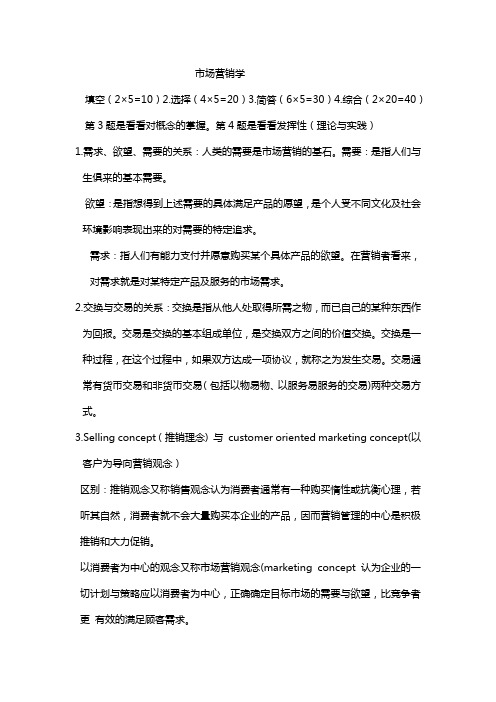
市场营销学填空(2×5=10)2.选择(4×5=20)3.简答(6×5=30)4.综合(2×20=40)第3题是看看对概念的掌握。
第4题是看看发挥性(理论与实践)1.需求、欲望、需要的关系:人类的需要是市场营销的基石。
需要:是指人们与生俱来的基本需要。
欲望:是指想得到上述需要的具体满足产品的愿望,是个人受不同文化及社会环境影响表现出来的对需要的特定追求。
需求:指人们有能力支付并愿意购买某个具体产品的欲望。
在营销者看来,对需求就是对某特定产品及服务的市场需求。
2.交换与交易的关系:交换是指从他人处取得所需之物,而已自己的某种东西作为回报。
交易是交换的基本组成单位,是交换双方之间的价值交换。
交换是一种过程,在这个过程中,如果双方达成一项协议,就称之为发生交易。
交易通常有货币交易和非货币交易(包括以物易物、以服务易服务的交易)两种交易方式。
3.Selling concept(推销理念) 与customer oriented marketing concept(以客户为导向营销观念)区别:推销观念又称销售观念认为消费者通常有一种购买惰性或抗衡心理,若听其自然,消费者就不会大量购买本企业的产品,因而营销管理的中心是积极推销和大力促销。
以消费者为中心的观念又称市场营销观念(marketing concept 认为企业的一切计划与策略应以消费者为中心,正确确定目标市场的需要与欲望,比竞争者更有效的满足顾客需求。
①产生的时间不同。
推销观念盛行于20世纪30年代;营销观念形成于20世纪50年代。
②背景与条件不同。
推销观念是卖方市场向买方市场过渡阶段致使部分产品供过于求;营销观念是买方市场。
③核心思想不同。
推销观念运用推销与促销来刺激需求的产生;营销观念:消费者主权论发现需求并满足需求。
④营销顺序。
推销观念:企业→市场;营销观念:市场→企业→产品→市场⑤典型口号。
推销观念:我们卖什么,就让人们买什么:营销观念:顾客需要什么,我们就生产供应什么此外营销观念还有目标市场、顾客满意、整体营销和盈利性四大支柱。
营销信息系统名词解释
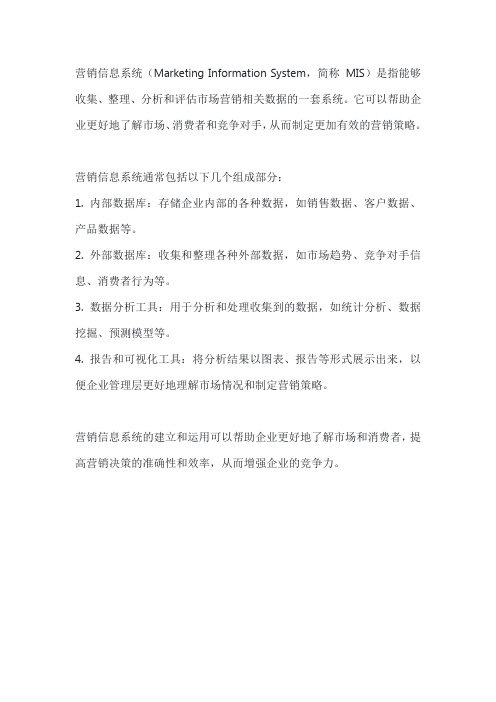
营销信息系统(Marketing Information System,简称MIS)是指能够收集、整理、分析和评估市场营销相关数据的一套系统。
它可以帮助企业更好地了解市场、消费者和竞争对手,从而制定更加有效的营销策略。
营销信息系统通常包括以下几个组成部分:
1. 内部数据库:存储企业内部的各种数据,如销售数据、客户数据、产品数据等。
2. 外部数据库:收集和整理各种外部数据,如市场趋势、竞争对手信息、消费者行为等。
3. 数据分析工具:用于分析和处理收集到的数据,如统计分析、数据挖掘、预测模型等。
4. 报告和可视化工具:将分析结果以图表、报告等形式展示出来,以便企业管理层更好地理解市场情况和制定营销策略。
营销信息系统的建立和运用可以帮助企业更好地了解市场和消费者,提高营销决策的准确性和效率,从而增强企业的竞争力。
- 1、下载文档前请自行甄别文档内容的完整性,平台不提供额外的编辑、内容补充、找答案等附加服务。
- 2、"仅部分预览"的文档,不可在线预览部分如存在完整性等问题,可反馈申请退款(可完整预览的文档不适用该条件!)。
- 3、如文档侵犯您的权益,请联系客服反馈,我们会尽快为您处理(人工客服工作时间:9:00-18:30)。
Sources of information - external sources
Organisations have the ability to buy information: The competition Professional bodies – CIM membership Experts/ management consultancies Trade magazines – see the Grocer Marketing Intelligence
Areas to collect data/information
The macro environment • Political • Economic • Social • Technological • Legal • Ecological Can we predict what issues they will throw up in the future that will affect our operations?
What do we use the information for
The information collected, stored and distributed can now be used for: • Analysis • Planning • Implementation and • Control
Tutorial
1. With regard to information what is the starting point for any organisation and why is this important? 2. What areas do organisations need to monitor and actively collect information from? 3. What is an MIS system? And how does it differ from a MKIS? 4. Identify some of the ways data and information can be collected for a MKIS.
Sources of information - internal process
When organisations have actively collected information through their management information systems, the marketing intelligence they bought and the marketing research the have undertaken they must look at the data collected from all three areas and try to make sense of it all and turn it in to information. Information analysis
Areas to collect data/information
• • • • • • Micro environment Marketplace – trends Customers – especially the target market Competition – what are they doing? Suppliers – what do they know? Intermediaries – who is threatening? Other stakeholders – publics who have an interest in our activities
Sources of information - external sources
The company can actually instigate their own research to solve their problems: Market research companies: hard copy (print) and on-line data – very expensive but valuable Surveys – very popular Observation – has much to offer marketers Experimentation – limited due to the need for control groups Marketing Research
The Marketing Information System (MKIS)
5
Sources of information - internal sources
Using the information collected through sales transactions, and found in the Management Information Systems (M.I.S.), it is what we know (or what we really should know!!) What customers buy When customers buy Where customers buy How much customers buy Who does the buying???? Internal databases
M.B.A.
The case for a Marketing Information System - MKIS
Information for Marketing Decision Mห้องสมุดไป่ตู้king
A CEO at Unilever was once quoted as saying
“if Unilever only knew what it knows, it would double it’s profits” This highlights the fact that organisations need to work out – 1. What they need to know 2. A system to collect data for information 3. Ways to disseminate the information
